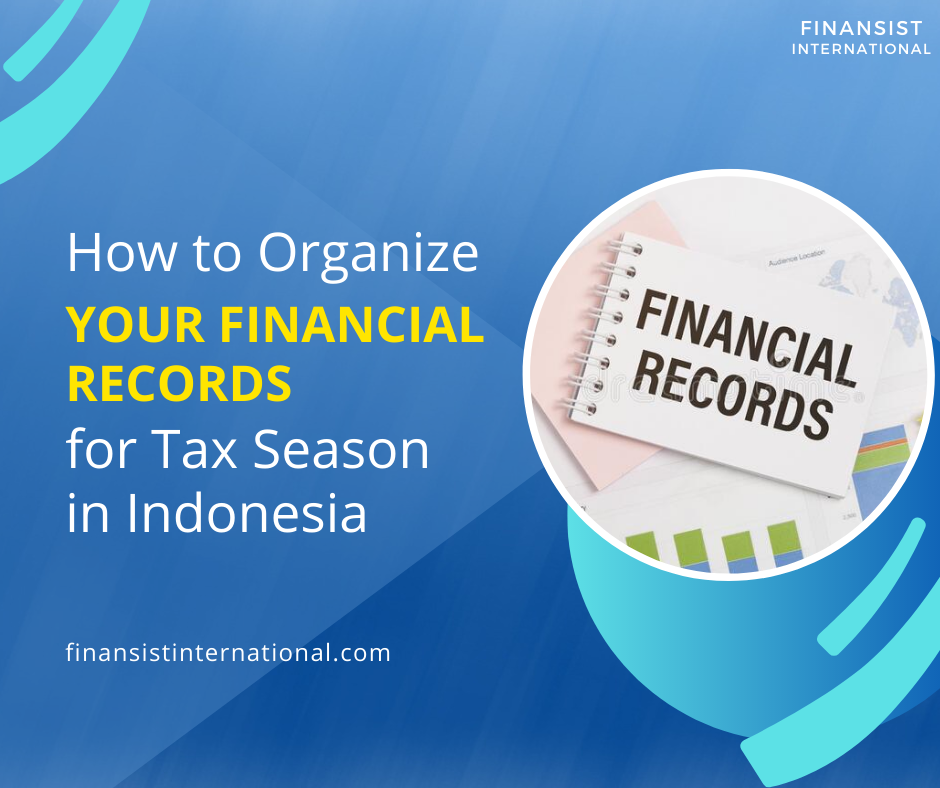In this article, we will guide you through essential steps to organize your financial records effectively, ensuring a smooth tax season for your business in Indonesia.
As an entrepreneur or company planning to open a business in Indonesia, it’s crucial to organize your financial records efficiently for tax season. Properly managing your financial documentation not only ensures compliance with Indonesian tax laws but also helps you make informed business decisions and maximize your tax benefits.
1. Set Up a Systematic Record-Keeping Process:
To start, establish a systematic process for managing your financial records from the beginning. Utilize accounting software or hire a professional accountant who understands the Indonesian tax regulations and can help you set up a suitable record-keeping system. This system should include categorizing and organizing your financial documents, such as receipts, invoices, bank statements, and payroll records.
2. Maintain Separate Business and Personal Accounts:
It’s essential to keep your business and personal finances separate. Open a dedicated bank account for your business transactions to streamline record-keeping and avoid confusion. This practice not only simplifies tax preparation but also demonstrates your commitment to maintaining transparency and professionalism in your business operations.
3. Track and Document All Business Expenses:
Accurate tracking of business expenses is vital for both tax deductions and financial analysis. Keep a meticulous record of all business-related expenses, including office rent, utilities, supplies, marketing costs, and employee salaries. Utilize accounting software or digital expense management tools to simplify the process and maintain a clear audit trail for tax purposes.
4. Maintain Sales and Purchase Records:
In Indonesia, it is crucial to keep track of your sales and purchase records. Maintain comprehensive documentation of all sales transactions, including invoices issued and received. Additionally, organize your purchase records, such as supplier invoices and payment receipts. Accurate and up-to-date sales and purchase records are essential for calculating Value Added Tax (VAT) and ensuring compliance with Indonesian tax regulations.
5. Prepare Payroll and Employee Records:
If you have employees, it’s crucial to maintain proper payroll records, including salary payments, tax withholdings, and social security contributions. Ensure you comply with Indonesian labor laws, such as minimum wage requirements, holiday pay, and social security obligations. Additionally, keep records of employment contracts, employee benefits, and any relevant documents related to your workforce.
6. Keep Track of Tax Deadlines:
Familiarize yourself with the tax deadlines in Indonesia to avoid penalties and late fees. The most critical tax deadlines include monthly and annual tax returns, payment of taxes, and submission of financial statements. Create a calendar or set reminders to ensure you meet all deadlines promptly. Consider consulting with a tax professional or hiring a local accountant to guide you through the Indonesian tax system and ensure compliance.
7. Retain Documents for Statutory Periods:
According to Indonesian tax laws, it is necessary to retain financial records for a specific period. Generally, it is advisable to keep records for at least five years. Ensure your records are easily accessible and stored securely to comply with local regulations and facilitate any future audits or inquiries.
Organizing your financial records is a critical responsibility for entrepreneurs and companies operating in Indonesia. Follow these steps tailored for businesses opening in Indonesia to effectively organize your financial records for tax season. By maintaining accurate financial documentation, you can ensure compliance with Indonesian tax regulations, maximize tax benefits, and focus on growing your business. Consult with professionals familiar with Indonesian tax laws to ensure adherence to specific requirements. Optimize your tax season in Indonesia with well-organized financial records.
Finansist International has sources of information and access needed by domestic and foreign entrepreneurs. As well as foreign companies wishing to invest in Indonesia. We can provide information resources for legal purposes and provide accounting and tax services for companies starting their business in Indonesia. Immediately schedule a free consultation at finansistinternational.com to plan your business in Indonesia. Also check our social media in this link for updates and promos.



